

Share
19th March 2019
02:21pm GMT

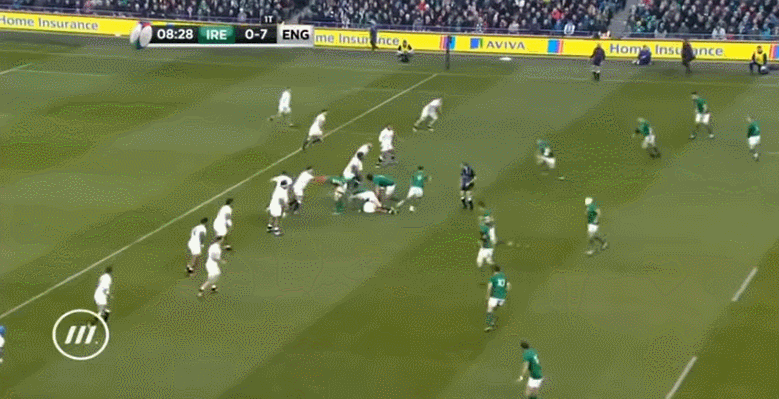 England prop Kyle Sinckler bites on the Murray dummy but teammate George Kruis covers for him and makes the tackle to ensure that there's no gap for the Munster half-back to exploit.
Much later in the game England read another wrap around play to perfection as Billy Vunipola comes out of the line and accelerates through to take Sexton down behind the gainline.
England prop Kyle Sinckler bites on the Murray dummy but teammate George Kruis covers for him and makes the tackle to ensure that there's no gap for the Munster half-back to exploit.
Much later in the game England read another wrap around play to perfection as Billy Vunipola comes out of the line and accelerates through to take Sexton down behind the gainline.
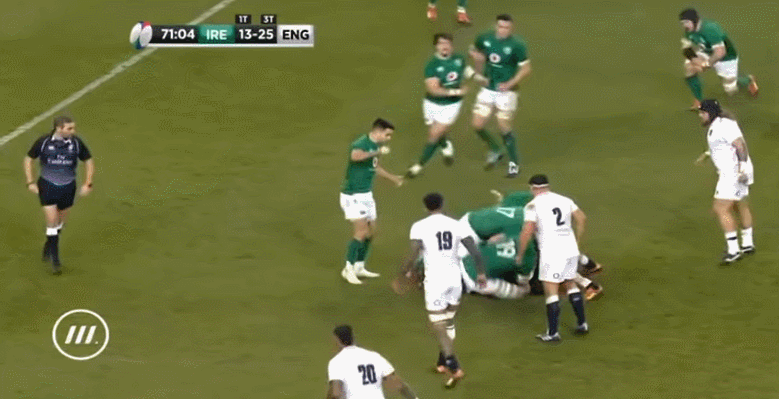 The ball is slow and the English defence are more than ready to deal with Ireland's patented loop play.
Ireland enjoyed great success against France with the loop but England were very aware to what was coming at them and were more than equipped to snuff out the play.
The other good thing England did was bring pressure. It's been no secret that opposition teams have targeted Sexton. You stop Sexton, you stop Ireland has been a solid mantra for most teams facing Joe Schmidt's side and England found great success here.
The ball is slow and the English defence are more than ready to deal with Ireland's patented loop play.
Ireland enjoyed great success against France with the loop but England were very aware to what was coming at them and were more than equipped to snuff out the play.
The other good thing England did was bring pressure. It's been no secret that opposition teams have targeted Sexton. You stop Sexton, you stop Ireland has been a solid mantra for most teams facing Joe Schmidt's side and England found great success here.
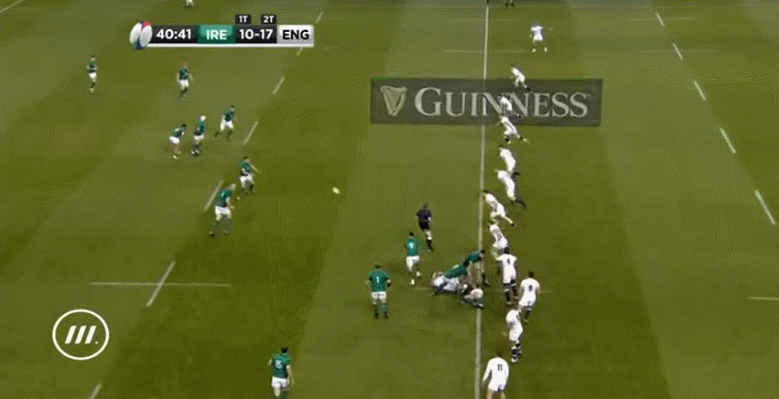 Later in the half England were again able to bring a lot of pressure on the Irish backs and their staggered defensive line worked well as centre Henry Slade tracks the ball and hits Robbie Henshaw as he's passing to force the pill loose and prompt a turnover.
Later in the half England were again able to bring a lot of pressure on the Irish backs and their staggered defensive line worked well as centre Henry Slade tracks the ball and hits Robbie Henshaw as he's passing to force the pill loose and prompt a turnover.
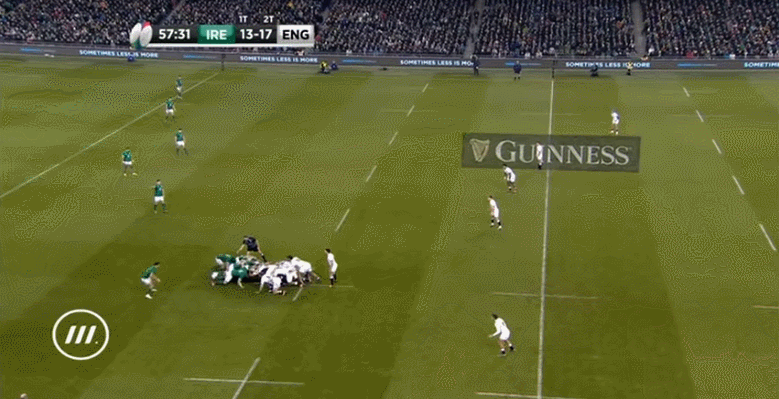 Against Wales, the mistakes were much more elementary.
Sexton kicking the ball dead from the restart. Kicking a Garryowen out on the full. Knocking the ball on. Passing the ball out of play.
It was a horrorshow from Ireland and uncharacteristic of a team that has generally prided itself on organisation, execution and discipline.
Against Wales, the mistakes were much more elementary.
Sexton kicking the ball dead from the restart. Kicking a Garryowen out on the full. Knocking the ball on. Passing the ball out of play.
It was a horrorshow from Ireland and uncharacteristic of a team that has generally prided itself on organisation, execution and discipline.
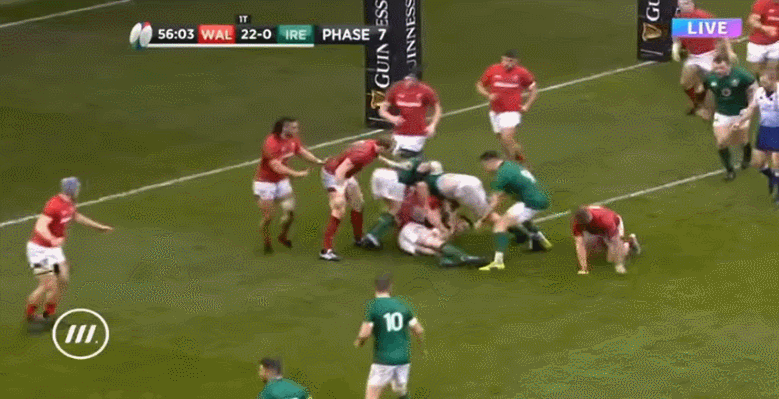 Ireland head coach Joe Schmidt said after the Wales game that he backed Sexton and Murray to find their form during the campaign and that he wasn't pressured into pulling the plug on either player.
Ireland head coach Joe Schmidt said after the Wales game that he backed Sexton and Murray to find their form during the campaign and that he wasn't pressured into pulling the plug on either player.
"We’re trying to build those two guys forward. They haven’t had a huge amount of game time so I think it’s important to invest in people. “That was part of the remit we decided we were going to prioritise in this Six Nations. Whether it bears fruit at the other end of this season, we’ll see. “But I don’t get into prognostics, all I do is try to get into preparation. The best preparation for top-class players is to be in pressure-cooker situations and to work their way through them. “If, every time that isn’t going well, you take them off, I don’t think you’re growing them back to where they need to be. “They’ve had so many days in the team where they’ve been the hub upon which the wheel has turned and the wheel has generally gone forward. Over the last two years, we’ve played 26 Test and lost three of them. “To lose today is really tough but those two guys are not the reason we lost. Those two guys, we’ll continue to invest in just as we have in Jack Carty and getting Kieran Marmion back – I thought he came on and did really well. “John Cooney has acquitted himself well in the earlier part of the championship as well, so you just keep trying to grow people and keep trying to keep your confidence in them so they keep their confidence in themselves.”Schmidt is ultimately right. Ireland have won 23 of their last 26 tests and so much of their success has stemmed from the performances of Murray and Sexton. They're viewed on par, if not better than, Aaron Smith and Beauden Barrett although in this championship they've looked a far cry from the best 9 and 10 combination in world rugby. How much of the blame do they deserve for Ireland's downfall? Some, maybe significant, but they can't fix Rory Best's line-out throwing. They can't stop Cian Healy hitting guys away from the ruck, or starting Robbie Henshaw at full-back, or leaving Jordan Larmour on the bench until the 65th minute, in a game they're losing 22-0, for a guy in Rob Kearney that hasn't scored a try since 2015. Ireland made so many different mistakes throughout the championship that it's hard to pin their downfall on two players but Sexton and Murray are two of about six guys - including Tadhg Furlong, James Ryan, Jacob Stockdale and Peter O'Mahony - that are genuinely world class - and when they don't perform the blame will lie with them as much as the credit is bestowed on them in victory. The thing with world class players is that form is temporary and class is permanent. The thing with world class teams is that they can quickly derail as we saw with Eddie Jones' England after back-to-back championships in 2016 and 2017. Resurrecting Ireland will be one of the biggest challenges of Joe Schmidt's career, and as he said:
"They’ve had so many days in the team where they’ve been the hub upon which the wheel has turned and the wheel has generally gone forward"What does he do when the wheel has come to a halt? Figure it out, presumably, like he always tends to do.
Explore more on these topics: